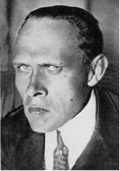 Daniil Ivánovich Kharms was a 20th century Russian poet and dramatist whose poetry is usually categorised as absurdist or surrealist.
Daniil Ivánovich Kharms was a 20th century Russian poet and dramatist whose poetry is usually categorised as absurdist or surrealist.
He was born Daniil Ivánovich Yuvatchov on the 30th December 1905 in St. Petersburg into a family constantly at odds with the government. His father, Ivan, was a member of “The People’s Will” which was a subversive, revolutionary group whose activities included acting against the ruling Tsar Alexander III. Not surprisingly Yuvatchov had already served time in prison by the time his son was born.
Daniil attended St Peter’s School and had an early interest in reading the books of Arthur Conan Doyle and it is thought that his pseudonym “Kharms” derived from a misheard version of “Holmes or Harms”. He was an able student, learning some English and German, and he went on to study at the Leningrad Electrotechnicum in 1924, although he did not stay there for long. Some reports have him expelled for possibly anti-social behaviour. He was determined to carry on studying literature though and he joined a group run by “sound-poet” Aleksandr Tufanov and including a young poet called Alexander Vvedensky. Kharms was writing poetry and plays and one of these, Elizabeth Bam, was performed in 1928.
His output of work varied from the absurd to simplistic material fit for children and he achieved great success with the latter, between 1928 and 1941. Alongside this though he was a founding member of an avant-garde artistic group called “Oberiu”, or the “Union of Real Art”. He was an advocate of “Russian Futurism”, firmly believing that the normal rules of society did not apply to art. He could see meanings in objects and words that defied definition in the truest sense. He was certainly regarded, during the late 1920s, as a writer of great talent, if not one of eccentric behaviour.
The fate that befell many intellectuals and artists at this time was to come his way when, in 1931, he was arrested for writing anti-Soviet material for children. They had no time for avant-garde behaviour in society and insisted that writers, especially those producing work for children to enjoy, should ensure that Soviet values and ideas were present in their work. Kharms was exiled for his pains but carried on where he left off on his return. This time, though, his name did not appear in the credits so much.
Very little of his work for adult audiences was ever published during his lifetime but much of it, along with his more common pieces for children, was eventually published and distributed in the West during the 1960s. After the ”glasnost” initiatives of Mikhail Gorbachev he became much better known worldwide. Here is an example of Kharms’s “absurdist” style of prose-poetry. It is a curious piece called The Red Haired Man:

As the 1930s progressed towards the outbreak of the Second World War Kharms found himself in trouble with the authorities once again and, in mid-1941, he was arrested on a charge of treason. It is likely that his work was seen as anti-Soviet so it would be easy to call him, and others like him, a traitor to the State. He found himself in Leningrad Prison No 1, in the psychiatric ward, and he died an agonising death, probably of starvation. Many thousands more perished in that city during the Nazi siege of Leningrad.
A western-published anthology of his work appeared in 2009 under the title Today I Wrote Nothing: The Selected Writings of Daniil Kharms. It was translated from Russian by Matvei Yankelevich.
Daniil Ivanovich Kharms died on the 2nd February 1942, aged 36.

